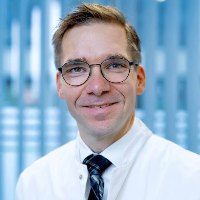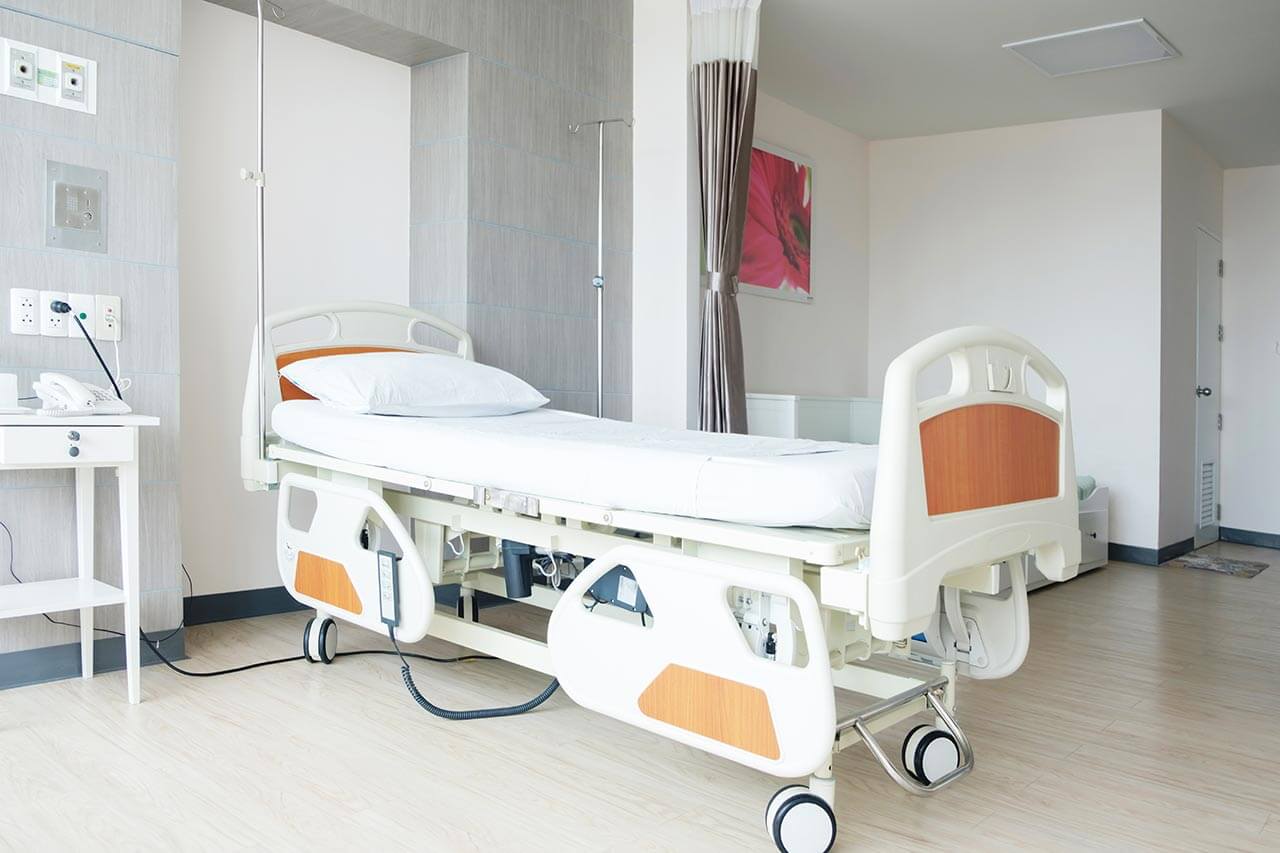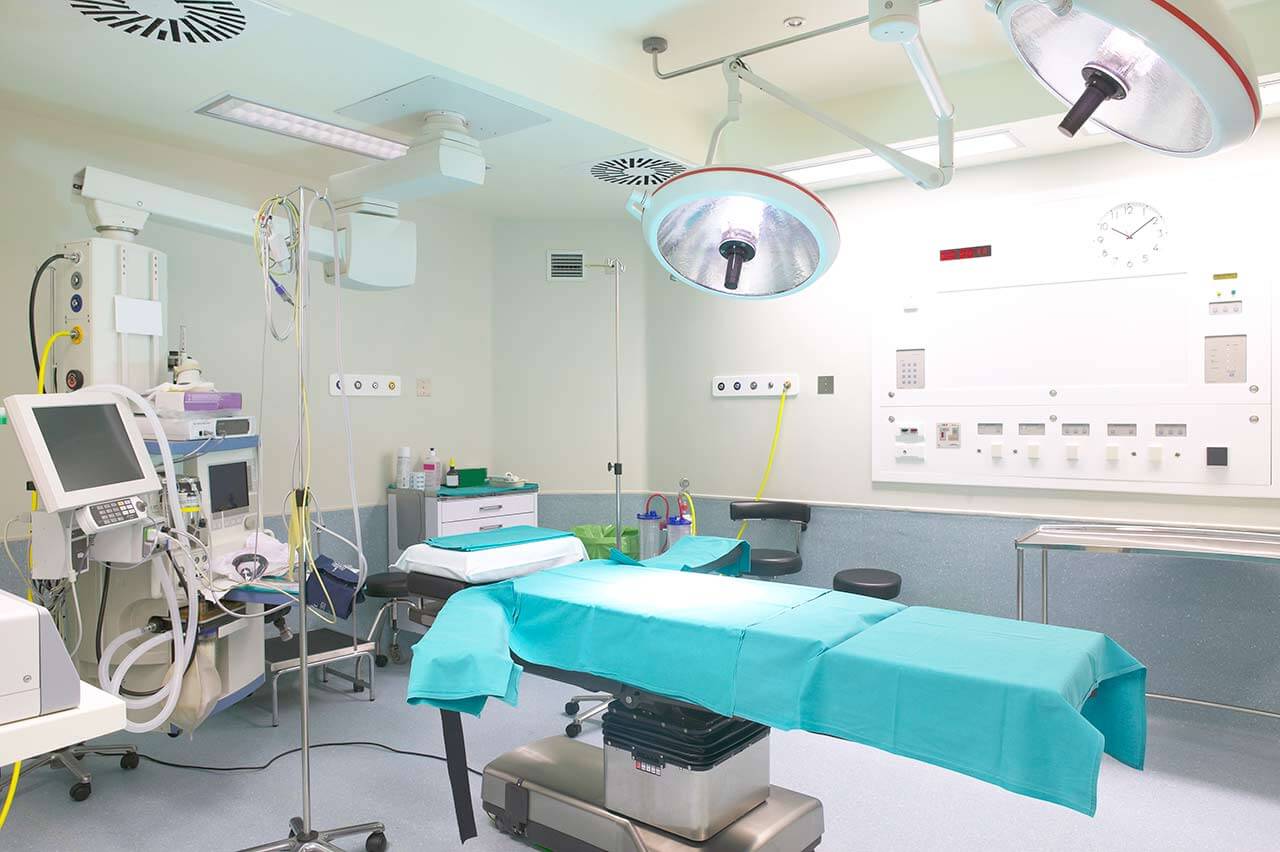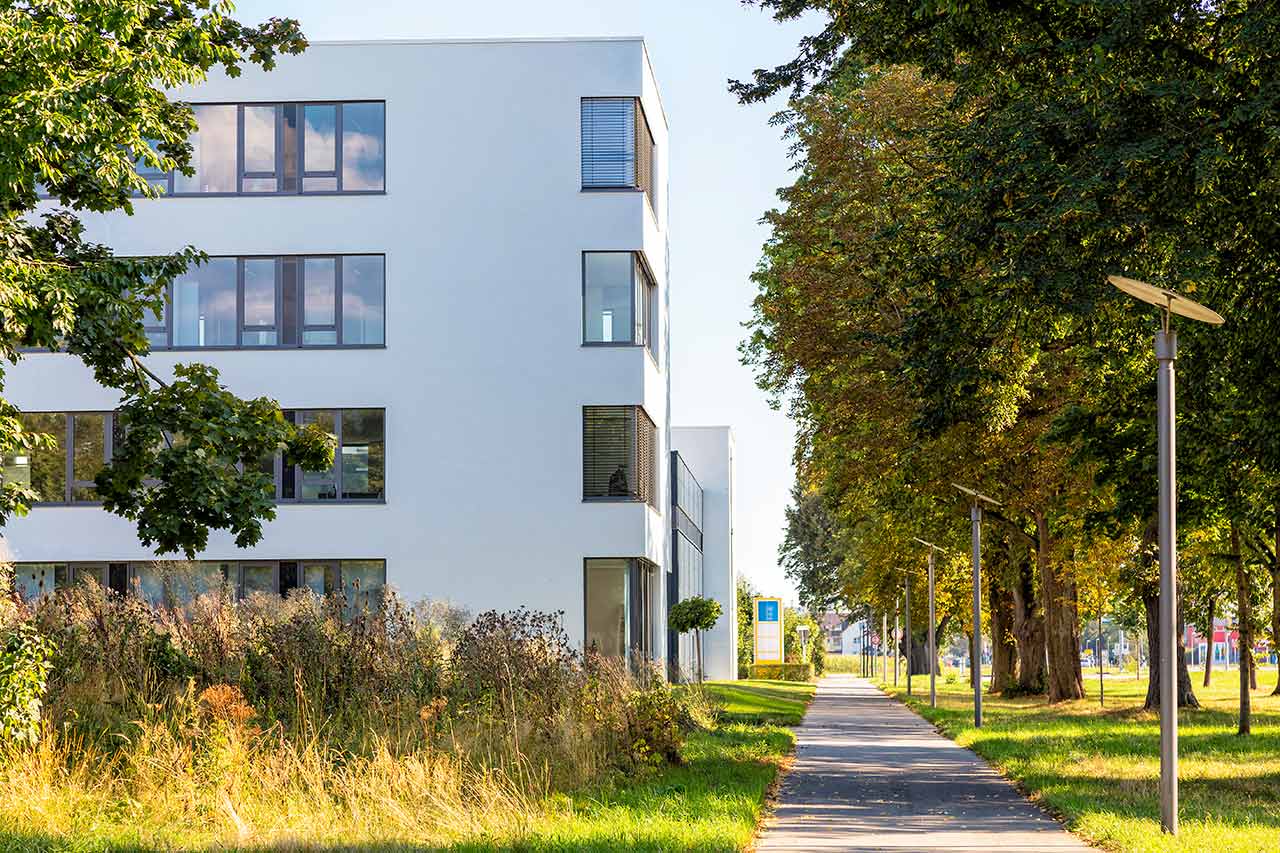
The program includes:
- Initial presentation in the clinic
- case history collection
- general clinical examination
- laboratory tests:
- complete blood count
- biochemical analysis of blood
- indicators of inflammation
- indicators blood coagulation
- preoperative care
- rhinoplasty
- symptomatic treatment
- cost of essential medicines
- nursing services
- elaboration further recommendations
Required documents
- Medical records
- Photo of the target body region
Service
You may also book:
 BookingHealth Price from:
BookingHealth Price from:
About the department
The Department of Adult and Pediatric Otolaryngology, Head and Neck Surgery at the Prosper Hospital Recklinghausen offers the full range of medical services in the areas of its specialization. The key focus of clinical practice is on the treatment of diseases of the middle, inner, and outer ear. The medical facility has gained impressive experience in cochlear implantation, placement of middle ear acoustic implants, and bone conduction implants. The department's specialists are also responsible for otoplasty, which is a plastic surgery for ear reshaping. The medical team also treats patients with diseases of the nose, paranasal sinuses, oral cavity, throat, pharynx, and larynx. The department's doctors specialize in the surgical treatment of benign and malignant head and neck tumors, as well as reconstructive plastic surgery in the face and neck. More than 3,300 inpatients and about 9,000 outpatients undergo treatment in the medical facility annually. A specially trained team of physicians takes care of the health of young patients. The department is one of the largest and best centers for the treatment of ENT diseases in North Rhine-Westphalia. The health facility provides all conditions for effective treatment in a comfortable atmosphere. The Head Physician is Prof. Dr. med. Magnus Teschner.
The focus of attention of the department's otolaryngologists is patients with ear diseases and hearing impairments. Regular consultations are provided for patients with otitis, tinnitus, middle ear polyps, cholesteatoma, dizziness, and other pathologies. The treatment of otitis media (inflammatory processes in the middle ear) involves the prescription of drug therapy with nasal sprays, painkillers, and antibiotics. For patients with tinnitus, it is important to identify the cause of the condition and provide treatment with appropriate medications; in many cases, patients with tinnitus receive symptomatic therapy (antidepressants, tranquilizers, and sedatives). A cholesteatoma is a neoplasm in the ear that is usually a complication of a prolonged course of otitis media. If left untreated, cholesteatoma may lead to the destruction of auditory ossicles, hearing loss (up to deafness), facial nerve paralysis, and other severe complications. The only effective therapeutic method is surgical resection of the neoplasm. In cases of severe hearing impairment, the hearing ossicles can be additionally replaced with miniature titanium prostheses (tympanoplasty) during cholesteatoma removal surgery.
The department successfully performs cochlear implantation in adults and children. The placement of a cochlear implant is a high-tech method of hearing restoration for patients with severe hearing loss and total deafness when the use of classical external hearing aids does not allow the patient to achieve the desired result. A prerequisite for cochlear implantation is the preservation of the auditory nerve fibers, subcortical and cortical hearing centers, and the patency of the cochlear duct. During the procedure, an active electrode is inserted into the cochlea. It consists of a chain of individual electrodes that transmit encoded acoustic information through electrical stimulation of the preserved auditory nerve fibers. The implantable part of the cochlear implant system is not wired to the external part and does not contain any power elements. The surgical intervention is performed under general anesthesia, and its duration is about 2-3 hours. The operation is necessarily followed by auditory-verbal therapy, during which a person learns to perceive, differentiate, and recognize sounds, as well as to understand their meaning. Cochlear implantation surgery is commonly performed on young children.
The department's team of doctors also specializes in treating nasal and paranasal sinus disorders. The doctors mostly treat inflammatory processes in the paranasal sinuses and perform surgery to remove polyps in the nasal cavity, surgery to reshape the nasal septum (septoplasty), and nasal reshaping surgery (rhinoplasty). Minimally invasive and endoscopic techniques are used during interventions for nasal and paranasal sinus disease, which contributes to the patient's rapid recovery in the postoperative period and the achievement of the best aesthetic outcomes.
The department's range of services also includes the treatment of oral, pharyngeal, and laryngeal tumors. The specialists have all modern methods for this purpose, including laser and radiofrequency techniques, computer-assisted surgery, etc. The choice of treatment method depends on the tumor localization, its spread, and the results of a histological examination. Aesthetic aspects are also taken into account during the surgical planning phase. A speech therapist will also provide follow-up treatment after surgery to correct speech or swallowing, if required.
The department's main clinical activities include:
- Diagnostics and treatment of ear diseases
- Otitis media (middle ear inflammation)
- Tinnitus (noises in the ears)
- Middle ear polyps
- Acute and chronic dizziness
- Middle ear malformations
- Skull base tumors, injuries, and malformations
- Cholesteatoma
- Diagnostics and treatment of nasal and paranasal sinus diseases
- Chronic paranasal sinus inflammation
- Deviated septum
- Nasal polyps
- Lacrimal duct stenosis and obstruction
- Diagnostics and treatment of salivary gland, oral, pharyngeal, and laryngeal diseases
- Benign and malignant tumors
- Tonsillitis
- Diagnostics and treatment of traumatic facial and neck injuries
- Midfacial fractures
- Nasal fractures
- Skull base injuries
- Diagnostics and treatment of hearing impairments
- Diagnostics and treatment of functional dysphonia (voice dysfunction)
- Diagnostics and treatment of vocal cord paralysis
- Diagnostics and treatment of other diseases
The department's therapeutic options include:
- Drug therapy
- Surgical interventions
- Surgery for ear diseases and hearing impairments
- Ear polyp removal
- Cholesteatoma removal
- Congenital middle ear malformation repair
- Tympanoplasty
- Otoplasty
- Cochlear implantation
- Acoustic middle ear implant placement
- Bone conduction implant placement
- Surgery for nasal and paranasal sinus diseases
- Septoplasty
- Septorhinoplasty
- Nasal polyp removal
- Rhinoplasty
- Surgery for salivary gland, oral, pharyngeal, and laryngeal diseases
- Surgical removal of salivary gland tumors and stones
- Surgical removal of laryngeal tumors
- Chordectomy
- Tonsillectomy
- Adenoidectomy
- Oral, pharyngeal, and laryngeal plastic reconstructive surgery
- Skull base surgery
- Plastic reconstructive surgery for head and neck defects, burns, and malformations
- Rhinoplasty
- Otoplasty
- Blepharoplasty
- Facelift
- Scar revision
- Surgery for ear diseases and hearing impairments
- Other medical services
Curriculum vitae
Since July 1, 2022, Prof. Dr. med. Magnus Teschner has been the Head of the Department of Adult and Pediatric Otolaryngology, Head and Neck Surgery at the Prosper Hospital Recklinghausen. He is board certified in otolaryngology and has numerous additional qualifications, including plastic and aesthetic facial surgery, allergology, dietology, and emergency medical care. Prof. Magnus Teschner is a certified expert in performing digital volume tomography of the ENT organs and X-ray diagnostics of the skull and ENT organs. The doctor has the DEGUM II certificate from the German Society for Ultrasound in Medicine and holds the title of Master of Business Administration in Healthcare. In addition, the Professor is a Faculty Member at the Hannover Medical School.
Prof. Magnus Teschner is a highly qualified specialist in the field of his competence. He consistently demonstrates high success rates in the treatment of patients with complex ENT diseases.
Photo of the doctor: (c) Prosper-Hospital Recklinghausen
About hospital
According to the prestigious Focus magazine, the Prosper Hospital Recklinghausen ranks among the top medical facilities in North Rhine-Westphalia!
The hospital enjoys the status of a modern medical complex with the highest standards of care and a long history of more than 175 years. The health facility is an academic hospital of the Ruhr University Bochum, which provides unimpeded access to medical innovations. With 530 beds, the hospital is known as the largest medical center in the region. The highly qualified doctors and nursing staff take care of patients' health. They always pay due attention to the individual needs and wishes of patients. The medical team's efforts are dedicated to ensuring that each patient receives effective treatment in a pleasant and comfortable atmosphere.
The hospital has 12 specialized departments. The key clinical focuses include gynecology, otolaryngology, urology, surgery, orthopedics, trauma surgery, gastroenterology, hematology, oncology, cardiology, pulmonology, nephrology, and radiology. Modern and proven methods, internationally recognized for their efficacy, are used during diagnostics and treatment. As for surgical treatment, doctors mostly perform sparing minimally invasive interventions, which reduce the risk of complications to zero and provide patients with the best aesthetic outcomes. Despite being minimally invasive, these operations are equally effective as traumatic open surgery.
Special emphasis is placed on cooperation with other hospitals in the region and throughout Germany. Notably, cooperation with the St. Elisabeth Hospital Herten plays an important role. A special focus is on international projects, which facilitate a productive exchange of experience and technology.
The hospital diagnoses and treats more than 17,000 inpatients every year, which indicates the impeccable reputation of the medical facility and the great credit of trust from patients. The quality of medical services is confirmed by numerous certificates, including the German Cancer Society (DKG) certification for the treatment of prostate cancer, kidney cancer, bladder cancer, and colon cancer, certification as the Competence Center for Hernia Repair Surgery from the German Society for General and Abdominal Surgery (DGAV), EndoCert certification as the Maximum Care Joint Replacement Surgery Center, and certification as the Trauma Center by the German Trauma Society (DGU).
Photo: (с) depositphotos
Accommodation in hospital
Patients rooms
The patients of the Prosper Hospital Recklinghausen live in comfortable single and double rooms with light colors and modern design. The standard patient room furnishing includes an automatically adjustable bed, a bedside table, a wardrobe, a table and chairs for receiving visitors, a telephone, and a TV. Wi-Fi is also available in the patient rooms. Each patient room has an ensuite bathroom with a shower and a toilet.
Meals and Menus
The hospital offers three tasty meals a day. Breakfast and dinner are served buffet style. The choice of dishes is quite diverse, so each patient will find meals to their liking. For lunch, the patient and their accompanying person are offered three set menus to choose from, including a dietary one. The hospital also serves fresh pastries daily.
If, for some reason, you do not eat all the foods, you will be offered an individual menu. Please inform the medical staff about your dietary preferences prior to treatment.
Further details
Standard rooms include:
Television
The patient rooms have televisions and radios. You will need headphones that can be purchased at the information desk or brought with you. For hygienic reasons, these headphones cannot be returned to the hospital staff. The use of personal televisions and radios is prohibited.
Religion
The hospital offers patients visits to church services. Both Catholic and Evangelical church services are held here. All services are held in a chapel located on the ground floor, which at other times is open for silent prayers.
If the patient cannot visit the chapel on their own to participate in the church service, the care specialists will deliver them there in bed or in a special chair (by prior arrangement).
Accompanying person
The accommodation of accompanying persons in the hospital is possible for an extra charge if there are free beds.
Hotel
You may stay at the hotel of your choice during the outpatient program. Our managers will support you for selecting the best option.




